英语语法-Unite 的用法
- 格式:doc
- 大小:21.00 KB
- 文档页数:1
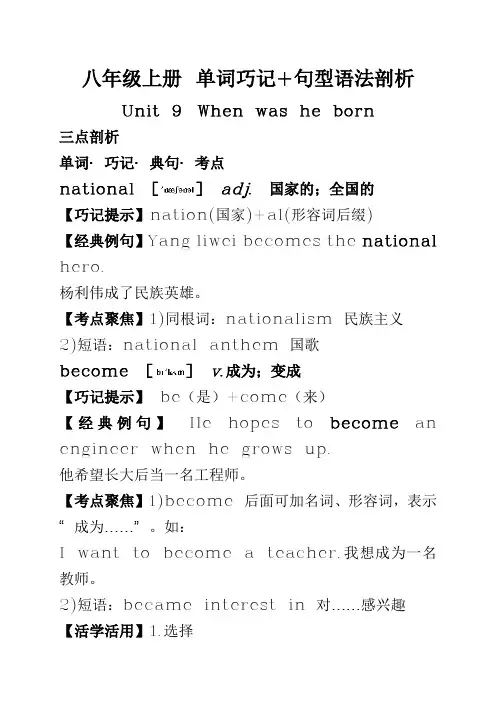
八年级上册单词巧记+句型语法剖析Unit 9When was he born三点剖析单词·巧记·典句·考点national []adj.国家的;全国的【巧记提示】nation(国家)+al(形容词后缀)【经典例句】Yang liwei becomes the national hero.杨利伟成了民族英雄。
【考点聚焦】1)同根词:nationalism 民族主义2)短语:national anthem 国歌become []v.成为;变成【巧记提示】 be(是)+come(来)【经典例句】He hopes to become an engineer when he grows up.他希望长大后当一名工程师。
【考点聚焦】1)become 后面可加名词、形容词,表示“成为……”。
如:I want to become a teacher.我想成为一名教师。
2)短语:became interest in 对……感兴趣【活学活用】1.选择When did she a movie star?A.becameB.becomeC.isD.was答案:Bcall []v.把……叫做;称呼;为……取名【巧记提示】c+all(所有的)【经典例句】You can call me Matthew.你可以叫我马太。
【考点聚焦】1) call后面加双宾语。
2)常见的短语:call at 访问(某地);call for 要求,号召;call on 拜访3)call还有“打电话”的意思。
如:Please call me when you come back.当你返回来的时候,给我打电话。
【活学活用】2.选择This is Tiger Woods,you can Woods.A.call himB.call heC.call for himD.call on him答案:Apiece []n.(艺术品、音乐的)幅;篇;首【经典例句】 What a beautiful piece of music!多好听的一首曲子啊!【考点聚焦】1)a piece of+不可数名词如:a piece of cloth 一块布;a piece of wood 一块木头2)在修饰后面的名词时,常把形容词放在piece的前面。
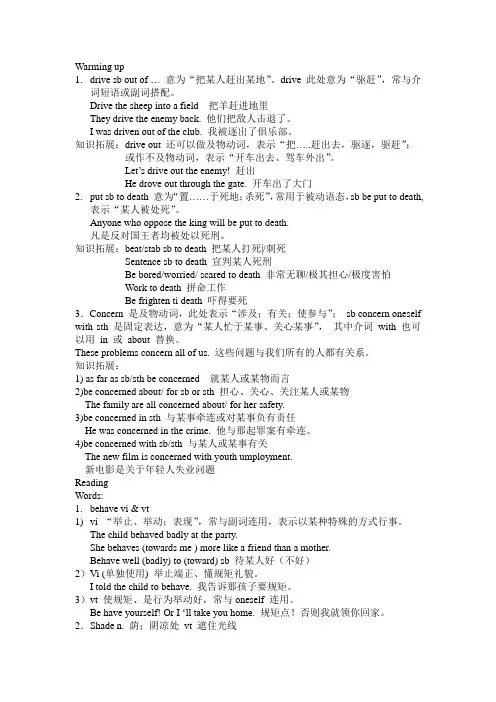
Warming up1.drive sb out of …意为“把某人赶出某地”。
drive 此处意为“驱赶”,常与介词短语或副词搭配。
Drive the sheep into a field 把羊赶进地里They drive the enemy back. 他们把敌人击退了。
I was driven out of the club. 我被逐出了俱乐部。
知识拓展:drive out 还可以做及物动词,表示“把…..赶出去,驱逐,驱赶”;或作不及物动词,表示“开车出去、驾车外出”。
Let‟s drive out the enemy! 赶出He drove out through the gate. 开车出了大门2.put sb to death 意为“置……于死地;杀死”,常用于被动语态,sb be put to death,表示“某人被处死”。
Anyone who oppose the king will be put to death.凡是反对国王者均被处以死刑。
知识拓展:beat/stab sb to death 把某人打死|/刺死Sentence sb to death 宣判某人死刑Be bored/worried/ scared to death 非常无聊/极其担心/极度害怕Work to death 拼命工作Be frighten ti death 吓得要死3.Concern 是及物动词,此处表示“涉及;有关;使参与”;sb concern oneself with sth 是固定表达,意为“某人忙于某事、关心某事”,其中介词with 也可以用in 或about 替换。
These problems concern all of us. 这些问题与我们所有的人都有关系。
知识拓展:1) as far as sb/sth be concerned 就某人或某物而言2)be concerned about/ for sb or sth 担心、关心、关注某人或某物The family are all concerned about/ for her safety.3)be concerned in sth 与某事牵连或对某事负有责任He was concerned in the crime. 他与那起罪案有牵连。
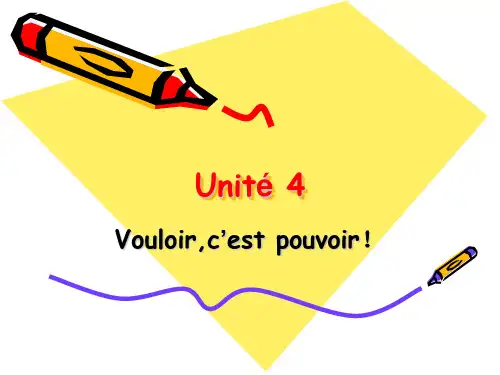
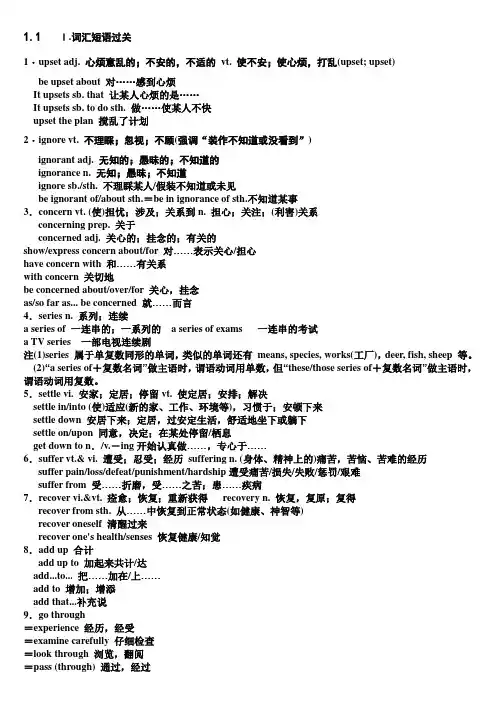
1.1 Ⅰ.词汇短语过关1.upset adj. 心烦意乱的;不安的,不适的vt. 使不安;使心烦,打乱(upset; upset) be upset about 对……感到心烦It upsets sb. that 让某人心烦的是……It upsets sb. to do sth. 做……使某人不快upset the plan 搅乱了计划2.ignore vt. 不理睬;忽视;不顾(强调“装作不知道或没看到”)ignorant adj. 无知的;愚昧的;不知道的ignorance n. 无知;愚昧;不知道ignore sb./sth. 不理睬某人/假装不知道或未见be ignorant of/about sth.=be in ignorance of sth.不知道某事3.concern vt. (使)担忧;涉及;关系到n. 担心;关注;(利害)关系concerning prep. 关于concerned adj. 关心的;挂念的;有关的show/express concern about/for 对……表示关心/担心have concern with 和……有关系with concern 关切地be concerned about/over/for 关心,挂念as/so far as... be concerned 就……而言4.series n. 系列;连续a series of 一连串的;一系列的 a series of exams 一连串的考试a TV series 一部电视连续剧注(1)series 属于单复数同形的单词,类似的单词还有means, species, works(工厂),deer, fish, sheep 等。
(2)“a series of+复数名词”做主语时,谓语动词用单数,但“these/those series of+复数名词”做主语时,谓语动词用复数。
5.settle vi. 安家;定居;停留vt. 使定居;安排;解决settle in/into (使)适应(新的家、工作、环境等),习惯于;安顿下来settle down 安居下来;定居,过安定生活,舒适地坐下或躺下settle on/upon 同意,决定;在某处停留/栖息get down to n./v.-ing开始认真做……,专心于……6.suffer vt.& vi. 遭受;忍受;经历suffering n. (身体、精神上的)痛苦,苦恼、苦难的经历suffer pain/loss/defeat/punishment/hardship遭受痛苦/损失/失败/惩罚/艰难suffer from 受……折磨,受……之苦;患……疾病7.recover vi.&vt. 痊愈;恢复;重新获得recovery n. 恢复,复原;复得recover from sth. 从……中恢复到正常状态(如健康、神智等)recover oneself 清醒过来recover one's health/senses 恢复健康/知觉8.add up 合计add up to 加起来共计/达add...to... 把……加在/上……add to 增加;增添add that...补充说9.go through=experience 经历,经受=examine carefully 仔细检查=be used up 用完拓展:break through 冲破get through 完成,通过live through 活过……look through 浏览cut through 穿过put through 接通电话10.set down(1)=write down 写下,记下(2)=put down 放下,搁下(3)=stop and allow sb. to get off 让某人下车(4)=explain or describe to oneself as 解释为,认为拓展:set about doing sth.开始干某事=set out to do sth.set off开始;出发(=set out);引爆set out出发;开始(后接to do);陈列;阐述set up建立,创设,开办set back把(钟表指针)往回拨set aside留出;不顾;取消set free释放;解放set sb. a good example为……树立好榜样11.in order to 为了……(1)in order to 引导的目的状语,可置于句首或句末,so as to 引导的目的状语,其位置一般在句末。
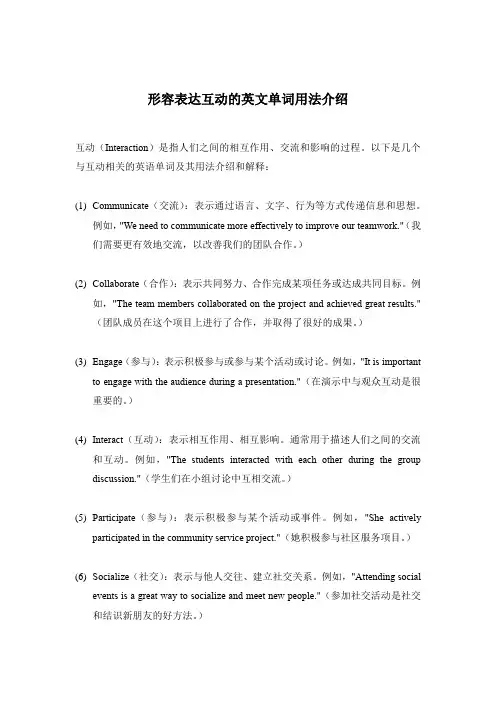
形容表达互动的英文单词用法介绍互动(Interaction)是指人们之间的相互作用、交流和影响的过程。
以下是几个与互动相关的英语单词及其用法介绍和解释:(1)Communicate(交流):表示通过语言、文字、行为等方式传递信息和思想。
例如,"We need to communicate more effectively to improve our teamwork."(我们需要更有效地交流,以改善我们的团队合作。
)(2)Collaborate(合作):表示共同努力、合作完成某项任务或达成共同目标。
例如,"The team members collaborated on the project and achieved great results."(团队成员在这个项目上进行了合作,并取得了很好的成果。
)(3)Engage(参与):表示积极参与或参与某个活动或讨论。
例如,"It is importantto engage with the audience during a presentation."(在演示中与观众互动是很重要的。
)(4)Interact(互动):表示相互作用、相互影响。
通常用于描述人们之间的交流和互动。
例如,"The students interacted with each other during the group discussion."(学生们在小组讨论中互相交流。
)(5)Participate(参与):表示积极参与某个活动或事件。
例如,"She activelyparticipated in the community service project."(她积极参与社区服务项目。
)(6)Socialize(社交):表示与他人交往、建立社交关系。
例如,"Attending socialevents is a great way to socialize and meet new people."(参加社交活动是社交和结识新朋友的好方法。
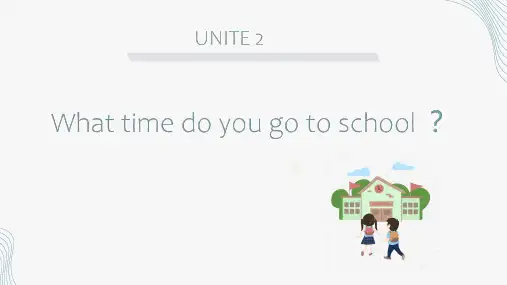
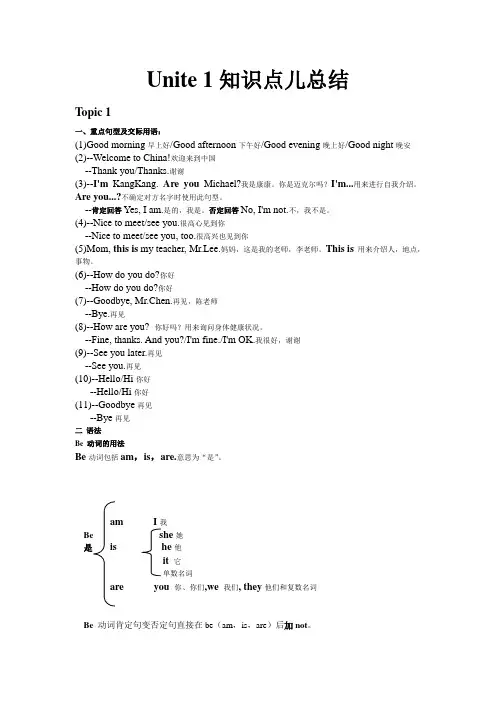
Unite 1知识点儿总结Topic 1一、重点句型及交际用语:(1)Good morning早上好/Good afternoon下午好/Good evening晚上好/Good night晚安(2)--Welcome to China!欢迎来到中国--Thank you/Thanks.谢谢(3)--I'm KangKang. Are you Michael?我是康康。
你是迈克尔吗?I'm...用来进行自我介绍。
Are you...?不确定对方名字时使用此句型。
--肯定回答Y es, I am.是的,我是。
否定回答No, I'm not.不,我不是。
(4)--Nice to meet/see you.很高心见到你--Nice to meet/see you, too.很高兴也见到你(5)Mom, this is my teacher, Mr.Lee.妈妈,这是我的老师,李老师。
This is用来介绍人,地点,事物。
(6)--How do you do?你好--How do you do?你好(7)--Goodbye, Mr.Chen.再见,陈老师--Bye.再见(8)--How are you? 你好吗?用来询问身体健康状况。
--Fine, thanks. And you?/I'm fine./I'm OK.我很好,谢谢(9)--See you later.再见--See you.再见(10)--Hello/Hi你好--Hello/Hi你好(11)--Goodbye再见--Bye再见二语法Be 动词的用法Be动词包括am,is,are.意思为“是”。
am I我Be she她是is he他it 它单数名词are you 你、你们,we 我们, they他们和复数名词Be 动词肯定句变否定句直接在be(am,is,are)后加not。
Be 动词肯定句变疑问句,一调二该三问号。
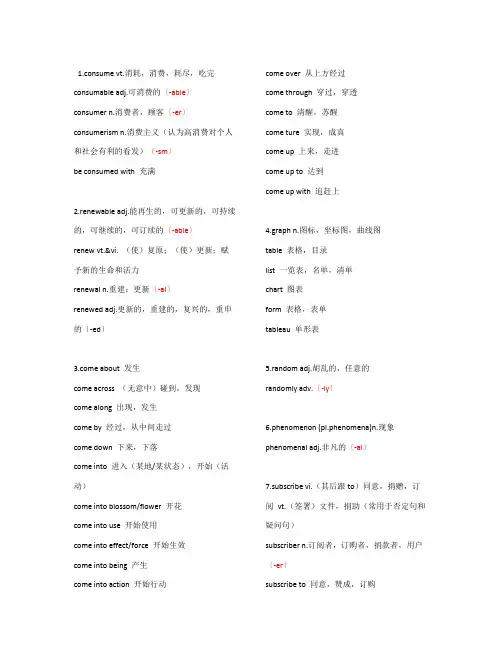
1.consume vt.消耗,消费,耗尽,吃完consumable adj.可消费的〔-able〕consumer n.消费者,顾客〔-er〕consumerism n.消费主义(认为高消费对个人和社会有利的看发)〔-sm〕be consumed with 充满2.renewable adj.能再生的,可更新的,可持续的,可继续的,可订续的〔-able〕renew vt.&vi. (使)复原;(使)更新;赋予新的生命和活力renewal n.重建;更新〔-al〕renewed adj.更新的,重建的,复兴的,重申的〔-ed〕e about 发生come across (无意中)碰到,发现come along 出现,发生come by 经过,从中间走过come down 下来,下落come into 进入(某地/某状态),开始(活动)come into blossom/flower 开花come into use 开始使用come into effect/force 开始生效come into being 产生come into action 开始行动come over 从上方经过come through 穿过,穿透come to 清醒,苏醒come ture 实现,成真come up 上来,走进come up to 达到come up with 追赶上4.graph n.图标,坐标图,曲线图table 表格,目录list 一览表,名单,清单chart 图表form 表格,表单tableau 单形表5.random adj.胡乱的,任意的randomly adv.〔-ly〕6.phenomenon (pl.phenomena)n.现象phenomenal adj.非凡的〔-al〕7.subscribe vi.(其后跟to)同意,捐赠,订阅vt.(签署)文件,捐助(常用于否定句和疑问句)subscriber n.订阅者,订购者,捐款者,用户〔-er〕subscribe to 同意,赞成,订购8.fossil n.化石,从地下采掘出来的(矿物)fossil fuel 化石燃料9.quantity n.量,数量in quantity 在数量上,大量地in (large) quantities 大量地a large quantity/large quantitis of 大量的...,即可以用来修饰可数名词也可以用来修饰不可数名词。
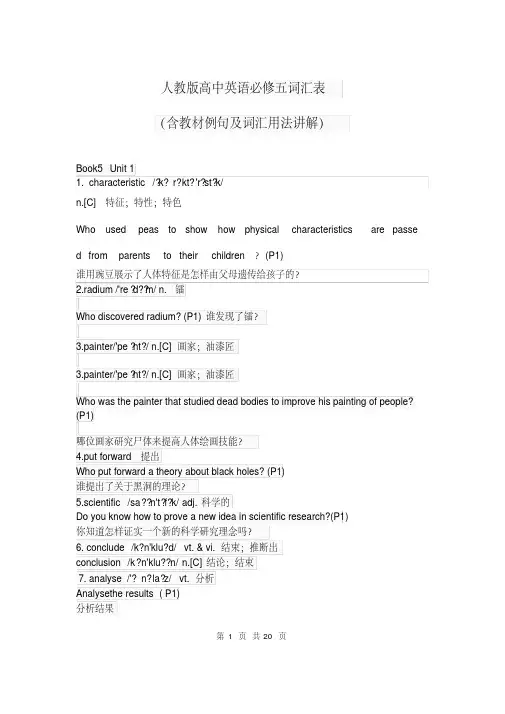
人教版高中英语必修五词汇表(含教材例句及词汇用法讲解)Book5 Unit 11. characteristic /?k?r?kt?'r?st?k/n.[C] 特征;特性;特色Who used peas to show how physical characteristics are passed from parents to their children?(P1)谁用豌豆展示了人体特征是怎样由父母遗传给孩子的?2.radium /'re?d??m/ n. 镭Who discovered radium? (P1) 谁发现了镭?3.painter/'pe?nt?/ n.[C] 画家;油漆匠3.painter/'pe?nt?/ n.[C] 画家;油漆匠Who was the painter that studied dead bodies to improve his painting of people? (P1)哪位画家研究尸体来提高人体绘画技能?4.put forward 提出Who put forward a theory about black holes? (P1)谁提出了关于黑洞的理论?5.scientific /sa??n't?f?k/ adj. 科学的Do you know how to prove a new idea in scientific research?(P1)你知道怎样证实一个新的科学研究理念吗?6. conclude /k?n'klu?d/vt. & vi. 结束;推断出conclusion /k?n'klu??n/ n.[C] 结论;结束7. analyse /'?n?la?z/ vt. 分析Analysethe results ( P1)分析结果第 1 页共 20 页8. △infect /?n'fekt/ vt. 传染;感染△infectious /?n'fek??s/ adj. 传染的What do you know about infectious diseases? (P1)你对传染病了解些什么?9.△cholera /?k?l?r?/n. 霍乱What do you know about cholera? (P1)你对霍乱了解些什么?10. defeat /d?'fi?t/ vt. 打败;战胜;使受挫JOHN SNOW DEFEAT “KINGCHOLERA”(P2)约翰·斯诺战胜“霍乱王”11.expert /'eksp??t/ a dj. 熟练的;经验或知识丰富的(反义词inexpert)John was a famous doctor in London—so expert, indeed, that he attended Queen Victoria as her personal physician. (P2)约翰·斯诺是伦敦一位著名的医生—他的确医术精湛,因而成为照顾维多利亚女王的私人医生。
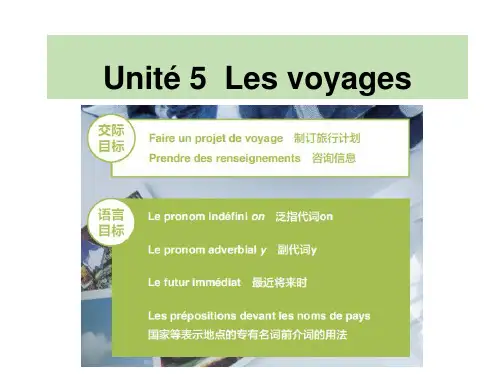
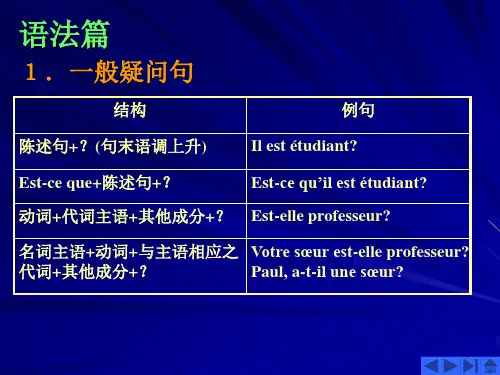
人教新课标必修五unit1词汇及语法解析1. characteristic用作名词,意思是“特点;特征;特性”与feature意思相近。
它也可用作形容词意为“典型的;具有…的特点的”。
Traffic jams are a characteristic of large cities. 堵车是大城市的特点。
The smell is characteristic of garlic. 这气味是大蒜的特点。
He speaks with characteristic passion. 他以特有的热情说话。
2. put forward的意思是“提出主意、计划(offer, suggest , an idea)等”。
He often puts forward some useful advice. 他常常提出一些有用的建议。
〖帮你归纳〗put的常用词组有:put aside节省(钱、时间);储蓄;把……放在一边put away储存(钱);放好put back拨慢;搁置put down放下;记下;击败;使(飞机)着陆;put off延期;推迟put on上演;穿上;戴上put out熄灭;关掉;扑灭put through接通电话;完成put up with忍受;忍耐put into action/effect/practice实施;实行3. examine的意思是“检查;审查;诊察;考察;测验”。
The doctor examined her carefully.医生仔细地给她作了检查。
The teacher examined the students on the book they read. 老师就学生读的书考学生。
examine指的是仔细观察以了解或发现什么东西,也可用于医生检查病人,以书面或口头的形式考察学生的知识与能力。
check指的是通过检查以确保某事物正确、安全、满意或处于良好状态,核对,核实某物等。
Unite 5 Do you want to watch a gameshow?知识点整理Unite5Doyouwanttowatchagameshow?知识点整理一、词组、短语:.wanttodosomething想做……2.hopetodosomething希望做……3.expecttodosomething期待做……4.plantodosomething计划做……5.joinsb(insomething)参加某人的……6.talkshow脱口秀7.sportsshow体育节目8.talentshow才艺展9.gameshow游戏节目10.soapopera肥皂剧11.scarymovies恐怖电影12.actionmovies动作电影13.comeout出版,发行,(花)开,(太阳等)出来14.bereadytodosomething准备做……15.tryone’sbesttodosomething尽最大努力做……16.asymbolofchineseculture中国文化的象征17.anothercartooncharacter另一个卡通形象18.oneofthemainreasons最主要的原因之一19.dressuplikeaboy装扮得象我男孩子20.takeherfather’splacetofightinthearmy代替父亲的位置去参军打仗21.playmulan’srolewell扮演木兰演得好22.didagoodjobinthemovie在这部电影中演得好23.showherloveforherfamily,friendsandcountry向家人,朋友和国家显示了她的爱24.seesomethingenjoyable看令人高兴的东西25.haveadiscussionaboutTVshows.对电视节目进行讨论26.Expecttolearnalotfromtalkshows期待从脱口秀中学到很多知识27.agreatwaytorelax一个放松的好方法28.showsthataremoreeducational=moreeducationalshows更有教育意义的节目afriendwhoissimilartoyou一个与你相似的朋友30.aplacewhereyoucanenjoytime一个你可以享受快乐时光的地方31.goodmoviesshowingrightnow现在正在上演的电影32.mostofthemoviesonrightnow大多数正在上演的电影33.oneveryfamoussymbolinAmericanculture美国文化中一个非常著名的象征34.theblackmousewithtwolargeroundears这只有着大而圆的耳朵的黑老鼠35.over80yearsago80多年前36.firstappearedinthecartoon第一次出现在卡通中37.whenthiscartooncameout…当这部卡通发行的时候……thefirstcartoonwithsoundandmusic第一部有声配乐卡通39.themanbehindmickeymickey身后的男人40.becameveryrichandsuccessful变得富裕而成功必背句子1.Somepeoplemightaskhowthiscartoonanimalbecamesopopul ar.有些人可能会问这个卡通动物怎样变得如此受欢迎了呢。
必修5第2单元重点词汇讲解必修5第2单元重点词汇讲解1. uniteunite [] vt.1. 使联合;统一;使团结2. 使混合3. 兼备(各种特性)She unites common sense and vision. 她兼具常识与见识。
4. 使结婚They were united at the church. 他们在教堂结婚。
vi.1. 联合;团结Let us unite to fight poverty and disease. 让我们齐心协力来克服贫困和疾病。
All the countries united to fight global recession. 所有的国家团结一致对抗全球性的不景气。
unite to do sth 联合起来做……2. 联合;混合Oil will not unite with water. 油水不相融。
unite with sth\sb 和…结合\联合unite、united和union有什么不同动词,过去分词和名词之分Unity is strength. 众志成城!Earthquake relief work . 抗震救灾!The nation is making a concerted effort to combat the earthquake and relief全国人民齐心协力、众志成城抗震救灾。
We all know that oil and water don’t __________.A. connectB. combineC. joinD. uniteEg. Oil will not unite with water. 油水不相融。
答案B\ Dconnect combine unite join的区别:combine; connect; join; unite此组动词意为“联合、连接”。
combine意为“结合、联合”,指为了某一目的而把两事物结合在一起。
unite的过去式和用法例句unite做动词有联合;合并;统一;团结等意思,那么你知道unite的过去式是什么吗?下面是店铺整理的unite的过去式和用法例句,欢迎各位同学们学习!unite的过去式和其他时态:过去式: united过去分词: united现在分词: unitingunite的用法:unite的用法1:unite的基本意思是“合并,统一”,指将两个或两个以上原本分散或对立的事物联合起来,联合后的各方失去了原来的独立性或原来的一些特征; 还可指主动去联合自己周围的人或物,使之围绕在自己身旁,即“团结”,通常带有一定的目的性,或为形成一个更大的单位,或为采取统一行动。
unite的用法2:unite可用作及物动词,也可用作不及物动词。
用作及物动词时,后接名词或代词作宾语。
可用于被动结构。
用作不及物动词时,后常接动词不定式作目的状语。
unite的用法3:unite的过去分词united可用作形容词,在句中作定语修饰其他名词。
unite的过去式例句:1. The United States plans to tighten the economic sanctions currently in place.美国计划加大现有经济制裁的力度。
2. The issue threatened to decouple Europe from the United States.这一问题可能会割裂欧洲同美国的关系。
3. As a boy he was a Manchester United fan.小时候,他是曼联队的球迷。
4. The Socialists united behind their probable presidentialcandidate, Michel Rocard.社会党人团结在他们很有希望当选的总统候选人米歇尔·罗卡尔周围。
5. Kernaghan missed the United game after he ricked his neck.克纳汉因为扭伤脖子而错过了联赛。
Unite“Unite” is a word that can be used both as a noun and anadjective. It represents the concept of bringing togethervarious individuals or groups to form a cohesive whole. In thisarticle, we will explore the different aspects of “Unite” anddelve into its significance in various contexts.Definition and UsageNoun form:“Unite” refers to the act of joining together or forming a single entity. It implies the coming together of separate parts to create a unified whole. The noun form is often used to describe the process or result of combining different elements or individuals.Example: The unite of different cultures creates a rich and diverse society.Adjective form:When used as an adjective, “unite” describes something that is characterized by unity or cohesion. It signifies the state of being together or joined as one.Example: The team’s unite effort led to their victory.Historical SignificanceThroughout history, the concept of “unite” has played a crucial rolein shaping nations, societies, and communities. From political alliances and social movements to cultural integration and international collaborations, the act of unification has been pivotal in driving progress and fostering understanding.One of the notable examples of unification is the formation of the United Nations (UN) after World War II. The purpose of the UN is to unite nations in a collective effort to maintain peace and security worldwide. It serves as a platform for member countries to address common challenges and promote international cooperation.Unite in PoliticsIn the realm of politics, the idea of uniting people and theiraspirations has been a driving force for change. Political parties and leaders often use the notion of unity to rally support and create a shared vision among diverse groups. Uniting people under a common objective can be a catalyst for social transformation and progress.For instance, the civil rights movement in the United States during the 1950s and 1960s aimed to unite people of all races in the fight against racial discrimination. Through peaceful protests and demonstrations, activists sought to create a united front against segregation andachieve equal rights for all citizens.Unite in SocietyIn society, the importance of unity is evident in various aspects of everyday life. Whether it’s within families, workplaces, or communities, a sense of unity fosters harmony, cooperation, and mutual understanding.Within families, unity is the fabric that binds individuals together in times of joy and adversity. Shared values, traditions, and beliefs contribute to a sense of belonging and create a strong support system.In workplaces, unity is crucial for achieving common goals and maintaining a productive environment. When employees unite around a shared purpose, they can overcome obstacles collaboratively and inspire innovation.Unite in CultureThe concept of uniting cultures has gained prominence in an increasingly interconnected world. Cultural exchange and integration have become key factors in promoting understanding and appreciation of diverse traditions, languages, and customs.Global events such as the Olympic Games exemplify the power of unity in celebrating diversity. Athletes from different nations come together to compete, transcending borders and fostering a spirit of camaraderie.This unification through sports promotes mutual respect and cultural exchange on a global scale.Benefits of UniteThe act of unification brings numerous benefits to individuals, communities, and societies as a whole. Some of the key advantages include:1.Strength in diversity: Uniting diverse perspectives and talentscreates a stronger, more resilient entity capable of addressingcomplex challenges.2.Enhanced cooperation: Unification fosters collaboration andencourages individuals and groups to work together towards commongoals.3.Increased understanding: By uniting, people gain exposure todifferent ideas, beliefs, and cultures, leading to greater empathy, tolerance, and cross-cultural understanding.4.Social progress: Unity within communities is often the drivingforce behind social change, as it enables collective actionagainst injustices and promotes equality.ConclusionIn conclusion, “unite” represents the act of joining together and the state of being united. Whether as a noun or an adjective, it plays a pivotal role in various contexts, including politics, society, and culture. The power of unification is evident throughout history andconti nues to shape our world today. By embracing the concept of “unite,” we foster cooperation, celebrate diversity, and work towards a more harmonious and inclusive future.。
Unite 的用法
★ unite既可作及物动词也可作不及物动词,意为“联合;团结”。
如:We should unite to fight poverty and disease.
我们应该团结起来为消除贫穷和疾病而斗争。
The more of the masses we unite with, the better.
我们联合起来的群众越多,就越有利。
The oceans do not so much divide the world as unite it.
与其说是海洋分割这个世界,不如说是统一这个世界。
We must work hard to unite all those who can be united. 我们要努力工作来团结一切可以团结的人。
[联想] united adj. 统一的;联合的;团结的;一致的
unity n. 统一;联合;整体
union n. 联合会;协会;联盟
[例句] United we stand; divided we fall.
团结则存,分裂则亡。
The figure on the left spoils the unity of the painting.
画中左边的人物破坏了全幅画的整体性。
He was elected the leader of the union.
他被评为工会的领导人。
[小试] 用unite的适当形式填空。
1. The _____ Kingdom takes in England, Wales, Scotland and Northern Ireland.
2. The design has a pleasing _____ and appearance.
3. Our goal is to _____ all the students in Class 1 to defeat Class 2.
Key: 1. United 2. unity 3. unite。